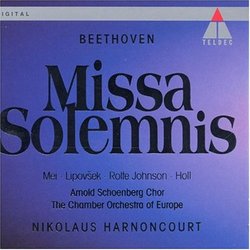| All Artists: Anthony Rolfe Johnson, Robert Holl, Arnold Schoenberg Chor Title: Beethoven: Missa Solemnis / Mei, Lipovsek, Rolfe Johnson, Holl; Harnoncourt Members Wishing: 0 Total Copies: 0 Label: Warner Music France Release Date: 3/9/1993 Album Type: Import Genre: Classical Styles: Opera & Classical Vocal, Historical Periods, Classical (c.1770-1830) Number of Discs: 2 SwapaCD Credits: 2 UPC: 090317488424 |
Search - Anthony Rolfe Johnson, Robert Holl, Arnold Schoenberg Chor :: Beethoven: Missa Solemnis / Mei, Lipovsek, Rolfe Johnson, Holl; Harnoncourt
 | Anthony Rolfe Johnson, Robert Holl, Arnold Schoenberg Chor Beethoven: Missa Solemnis / Mei, Lipovsek, Rolfe Johnson, Holl; Harnoncourt Genre: Classical
Beethoven conceived this piece for a liturgical ceremony--the elevation of his friend and patron Archduke Rudolf to high ecclesiastical office--but in the end delivered the music several years late. During that time, the p... more » |
Larger Image |
CD DetailsSynopsis
Amazon.com Beethoven conceived this piece for a liturgical ceremony--the elevation of his friend and patron Archduke Rudolf to high ecclesiastical office--but in the end delivered the music several years late. During that time, the piece had grown beyond the limitations of an actual service and become something else entirely. Like Bach's B-minor Mass, Beethoven's Missa Solemnis is one of the most gigantic settings of the text in existence, and one of the most difficult choral works ever for the singers. Nikolaus Harnoncourt's performance seems to thrive on the challenge. He directs an exciting and very human interpretation that's sung with impressive fervor and played to the hilt. This is the real McCoy. --David Hurwitz Similar CDs
Similarly Requested CDs
|
CD ReviewsScintillating or synthetic? R. C. Ross | Birmingham | 02/04/2003 (3 out of 5 stars) "Harnoncourt expresses the interesting idea that `beauty is to be found on the edge of safety'. When this dangerous search is successful the results can be illuminating and thrilling. They were in Harnoncourt's blazingly idiomatic performances of the symphonies - with the one notable exception of the `Pastoral'. That version of the Pastoral is a comparatively effete and flaccid affair (besides e.g. Walter, Schuricht, Klemperer, Szell, Norrington, etc.) And, disappointingly, Harnoncourt's view of the great Missa Solemnis is of a similar cut. It is in fact difficult listening to this version of the Missa Solemnis to recognise that this is the same conductor who gave such consummately satisfying versions of the symphonies. This performance seems almost wholly discontinuous with the spirit scintillating in Harnoncourt's performances of the 3rd, 4th, 5th , 7th and 8th symphonies in particular (though there are pre-echoes of his approach to the Missa in some parts of the performance of the 9th). There is little evidence here of the revelatory spirit that infused the performances of the symphonies. The `beauty' Harnoncourt achieves in the Missa sounds synthetic, an `affect' rather than a true expression of the sublime and incandescent soul of this towering masterpiece - here of all places in Beethoven that spells failure. There is an over-reliance on slow, even at times (in the Kyrie and Agnus Dei) languid tempi, conveying an impression that the meditative element is contrived - to this listener at least it doesn't sound `Beethovenian'. (As crude a measure as timings are they can be revealing - Kyrie: Harnoncourt 12.12 mins; Toscanini 9.06, Klemperer 9.26; Ormandy 9.58 (yes, Ormandy! not at all a bad performance); Agnus Dei, Harnoncourt 16.25; Toscanini 14.47; Klemperer 15.14; Ormandy 14.06.) Neither do the climaxes possess the gravitas that is essential to their faithful expression.As long as Klemperer's magisterial performance (New Philiharmonia Chorus and Orchestra) continues to radiate its incomparable glories Harnoncourt's recording will be eclipsed." This is the best "Missa Solemnis" recording. R. C. Ross | 08/04/1999 (5 out of 5 stars) ""Missa Solemnis" was the greatest choral work ever composed by Beethoven.Although it may not really sound like a solemn mass,this is a powerful,yet still a religious mass.Harnoncourt does his perfect job executing this mass along with great interpretation from the singers and the Chamber Orchestra of Europe.This recording had fulfil Beethoven's hope of"aweken religious feelings among the singers as well as listeners and to ensure this religious feelings lasted in their lifetime".This is a mandatory record for all fans of Beethoven." Period or perfect? Mr. Ian George Fraser | Brazil | 12/19/2007 (5 out of 5 stars) "What could Beethoven possibly have gone on to write after the 9th Symphony? Well, the Missa Solemnis of course. If you're not familiar with this piece, imagine the choral finale of the 9th multiplied by 7....:-)
Nicholas Harnoncourt is probably unique among conductors in being both a stickler for authenticity and period instruments and a believer in the "big sound". A contradiction in terms you might think. Well, you might ask did audiences at the beginning of the 19th century want a "small" sound? Harnoncourt is helped in this case by the fact that the major instrument in this huge piece is the human voice and from the Arnold Schoenberg choir he badgers a truly enormous effort. As a performer I can testify how exhausting this piece is to sing and no doubt modern technology has come to his rescue by allowing pauses between the almighty sections, which would never have been possible in live performance. The second section, "Gloria", for example, is as big as the finale of the Choral symphony, with which it incidentally shares a lot in common. But this music is not just about grandeur. Like the late string quartets, with which there are many fascinating comparisons, there is also a lot of thought-provoking and meditative music and this performance knows exactly when to pull in and pull out. One tiny example - right at the end of the Gloria: there is a line where the sopranos float up to be taken across by the flutes. On this recording you are not aware of the transition and the human voice blends in completely with the instrument. That is the hallmark of a great conductor and a great performance. This is unique piece and there is nothing else quite like it in anybody's repertoire. Beethoven was, by all accounts, not an especially pious man, and his personal beliefs may have been distinctly unorthodox, but he saw in the structural oddness of the Catholic Mass an unique opportunity and this is the result.This was the first time I had heard this conductor in a major piece. I am now seriously looking at his recording of the complete Beethoven symphonies. " |

 Track Listings (3) - Disc #1
Track Listings (3) - Disc #1
















